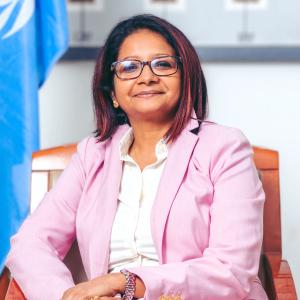- Honorable Ashatu Kijaji, Minister of Investment, Industry and Trade;
- Mr. Frank Ajilo, Country Representative, International Finance Corporation;
- Mr. Moremi Marwa, Chief Executive Officer, Dar es Salaam Stock Exchange;
- Mr. Simon Shayo, Board Chairman, Global Compact Network;
- CEOs and Senior Officials from private sector organizations;
- Sr. Government officials;
- Development partners;
- UN colleagues;
- Invited Guests;
Kwanza kabisa nawatakia wote Heri ya Siku ya Wanawake Duniani! (Let me start by wishing you a Happy Women’s Day!)
It gives me great pleasure to be here with you to represent the United Nations in Tanzania in today’s Ring the Bell for Gender Equality Conference 2022. Many congratulations to all the organizers for bringing attention to the important role that the private sector and private finance have to play in taking action to advance gender equality in Tanzania.
I am reminded what Dr Marlene Forrest, Managing Director of the Jamaica Stock Exchange, has very directly said: “Gender equality is not a “women’s issue”, rather it matters for society at large.”
As such, today is a day to celebrate, recognize and appreciate all women, including women who are working in the private sector and are fundamental to the performance of their companies.
This year’s global theme for International Women’s Day, ‘Gender equality today for a sustainable tomorrow’ recognizes that if we do not achieve gender equality today, a sustainable future, and an equal future, remains beyond our reach. Women continue to be underrepresented in leadership and decision-making, in boardrooms and C-suites, as the ‘glass ceiling’ weighs down on the glass and steel façade of corporate headquarters.
If we are to realize gender equality by 2030, urgent action is required including from the private sector. Women should not have to experience discrimination in any workplace because of their gender and should be treated as equals to their male counterparts. This should mean equal pay for equal work and equal consideration for promotion and leadership positions.
The United Nations reiterates that Stock Exchanges play a central role in the economies in which they operate. Globally, exchanges list over 50,000 companies with a market capitalization of over 90 trillion US Dollar. In many cases, the exchange defines, directly and indirectly, what is expected from the companies listed on its markets and the entities transacting through its markets. Policy makers, regulators, investors and civil society are increasingly demanding greater action on gender equality, on Environmental, Social & Governance or (ESG) priorities.
Indeed, ‘new age’ investors and consumers are demanding the generation of new values from corporates; for net-zero policies and for tighter linkages between ESG targets and executive compensation packages; they are also demanding socially conscious products and sustainable business practices. In sum, these growing demands can lead to a reimagination, reinvention and even total transformation of businesses and the business-as-usual. Exchanges are well-placed to meet this demand with an influence and a voice across the capital markets ecosystem.
In this regard, as I was reading the website of the DSE on the way here, I was genuinely encouraged to read none other than Mr Moremi Marwar’s notes[1] on Environmental, Social & Governance (ESG) priorities:
It is commendable that the DSE has incorporated ESG/Sustainability factors into its recently approved Rules – to guide the conduct for companies intending to issue green or social or social-sustainability bonds. Also, it is being mandated that listed companies will be required to report the status of ESG and Sustainability in their Annual Reports. I note these rules will be effective from 1st March 2022.
This is a step-up from DSE’s policy in the past, promoting voluntary disclosure on ESG by listed companies. I am also happy to note that the DSE is a partner Exchange to the United Nations-SSE Initiative[2] since 2016.
I also note that the DSE has recently approved a social-impact Bond targeting financing of women empowerment.
I am glad that the Women Empowerment Principles (WEPs) will be discussed today and I join UN Global Compact, UN Women and all stakeholders in encouraging all businesses to advance the SDGs and put the principles in place in their workplaces.
As the United Nations, we have had several partnerships with the private sector to promote gender equality and women empowerment initiatives and the SDGs more broadly and going forward, we are keen to build on and expand partnerships with the private sector to accelerate the achievement of Tanzania’s national development priorities and the SDGs.
I call on everyone to use International Women’s Day as an opportunity to reflect on how we can accelerate progress on achieving gender equality, and sustainability, by empowering women in the workplace and everywhere.
Asanteni sana.
[1] https://notesfrommoremi.wordpress.com/
[2] The SSE initiative is a UN Partnership Programme organized by UNCTAD, the UN Global Compact, UNEP FI and the PRI. The SSE’s mission is to provide a global platform for exploring how exchanges, in collaboration with investors, companies (issuers), regulators, policymakers and relevant international organizations, can enhance performance on ESG (environmental, social and corporate governance) issues and encourage sustainable investment, including the financing of the UN Sustainable Development Goals (https://sseinitiative.org/about/)






